|
Miscellaneous ruminations on random subjects
|
|
| |
|
|
| |
|
|
|
|
|
|
| |
New Jersey Ballot Layout Problems: I was not one of the people who ridiculed West Palm Beach voters back in 2000 for being unable to properly read their ballots, but my roommate was. So, he and I were both chagrined to realize after we voted that we'd neglected to completely fill out our ballots. Here's a pieced-together scan of the sample ballot sent out to all NJ residents before election day:
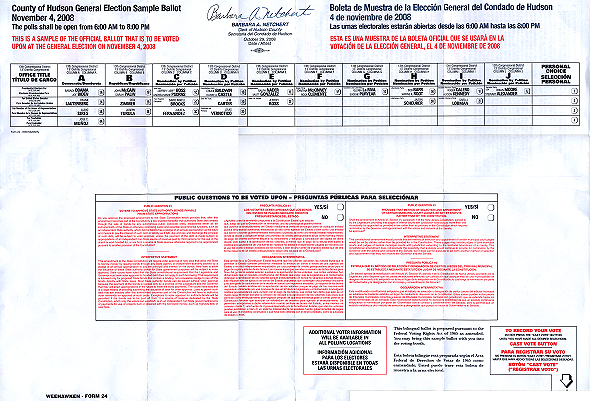
Note the 11 columns of parties at the top, but only 4 offices being voted for (president, senator, representative and "freeholder," i.e., like a city councilman but in a township, which is what Weehawken actually is). Then down below, there's all those blocks of red.
It was only when I was showing the sample ballot to my roommate just before we went to vote at 2pm on Election Day (he'd sent in his voter registration a few days below the deadline and hadn't received either his voter registration card or his sample ballot; I kept nagging him to send it in earlier, but...). Anyway, it was only at that point that I even noticed that the stuff in red was actually something we needed to vote on. We both read the ballot questions and the interpretations, and I decided I'd vote NO on principle to both, since I disapprove of deciding such issues via ballot initiative.
So, we both went off to the polling place two blocks away, and voted. Neither of us had voted with NJ's voting machines before, and both of us were rather puzzled about how to do it. It's not obvious that the X's next to the names on the ballot in front of you are actually buttons that you push that light up. Anyway, I figured it out and voted for the four offices at the top, and then recorded my vote. My roommate admitted he'd gone through the same puzzlement trying to figure it out, and cursed me for having refused assistance when asked by the poll worker ("Oh, no! I'm sure I can figure it out! Hah Hah!").
In any event, both of us simply spaced out on voting on the ballot measures. Indeed, a friend who is a lawyer (she's also a brilliant viol player, and plays in my viol consort) admitted she, too, had failed to vote on these.
I wondered how many people statewide had failed to vote. Well, it turns out the the numbers for these two ballot questions were only about 2/3s of the total who voted for President, so I suspect the three of us were not alone in failing to understand.
This is bad design. If you're going to have a huge space between one part of the ballot and the other part and you're going to print part of what you're voting for in BLACK and part of it in RED, then you need big arrows pointing down saying "Vote on these questions, too! -->>".
Or so it seems to me.
Early Voting Long Lines? One thing that has puzzled me is exactly why there were long lines for early voting two weeks before the election. If you didn't have early voting, everyone would be voting on a single day. With early voting, you've got 10-12 days where the polls are open, so, theoretically, you'd be dividing up the voters into groups 10-12 times smaller than you'd have on election day.
So, why the long lines?
Say, for instance, you assume that 50% of voters will vote early. You'd need 50% as many polling place hours as you'd have on Election Day (assuming the same number of voting booths and poll workers). If, for instance, your county has 100 polling places, you'd need 50 of them, assuming you had one day of early voting. If you had 10 days of early voting, theoretically, you could get by with 5 early-voting polling places.
Obviously, that's not going to work, because you'd still have places where more people showed up than expected. So, you might distribute your voting booths more thinly. If, for instance, at your 100 polling places on Election Day you would have 1000 voting booths, you might want to provide, say, 250 voting booths on each of the early voting days. You could do this by spreading them 10 each at 25 polling places, for instance.
If you did that, one expect that, given the law of averages, you might have a few polling places where on some days too many people showed up at once to prevent lines, but surely you oughtn't have dozens of polling places with long lines on multiple days, as seemed to be the case from the news reports.
So, what's up? Did the news media pick a few early voting sites with long lines and keep running the same video over and over again? Or did boards of election simply massively underprovision their early voting sites?
If it's the latter, then why was that? It's not like early voting was brand new -- there was a lot of it in previous election cycles. Maybe the people running our local elections are just stupid. Or maybe they just aren't trained adequately.
So far, I've seen no one try to explain it, except by saying "higher turnout than expected." How could turnout be so high that it causes long lines at may early voting sites day after day? And then that there'd still be long lines on Election Day?
Something doesn't add up.
Spread the Wealth: Leaving aside the odious attack on progressive taxation that is the basis for the right's fetishization of "spreading the wealth" as "socialism," I've always felt that nobody has pointed out that Obama wasn't talking about redistributing wealth through progressive taxation, but about the way that providing tax relief to the middle class injects money into the economy that comes into the pockets of small businessmen. The final paragraph of Obama's conversation with Wurzelbacher:
My attitude is that if the economy's good for folks from the bottom up, it's gonna be good for everybody. If you've got a plumbing business, you're gonna be better off if you're gonna be better off if you've got a whole bunch of customers who can afford to hire you, and right now everybody's so pinched that business is bad for everybody and I think when you spread the wealth around, it's good for everybody.
You can read the full exchange on Jake Tapper's blog, and my comments here are based on a re-reading of the full interchange there.
It seems to me quite clear that Obama is talking about trying to make the middle class the engine of the economy. He's saying that a plumber's business will be better when the middle class is doing better, that the small business owners will gain wealth when the middle class has money to spend.
Now, clearly, part of that is reducing the tax burden on the middle class, and the way Obama's tax plan does that responsibly is by taxing the wealthy at a higher rate than at present (but no higher than they were taxed during the boom years of the Clinton administration). McCain didn't try to be responsible in handing out tax cuts, and he was proposing giving tax cuts to the middle class, too -- just not as large as Obama's (and also giving even larger tax cuts to the very rich). So it seems to me that McCain was ineffectually trying to provide middle-class tax relief as a way of giving them more money, too, and that money would be spent on things that would cause wealth to be spread into the pockets of small business owners.
In other words, McCain's tax plan for the middle class is based on the same principle of "spreading the wealth" in the sense that Obama actually used the phrase.
Yet, the media, left and right, has completely accepted the McCain campaigns reframing of Obama's comment as referring to progressive taxation. Leaving aside the fact that the Bush tax policies (which McCain now supports, after having first opposed them) have redistributed massive amounts of wealth upward such that McCain's criticism of redistributive tax policy (while not advocating a flat tax) is hypcritical, nobody seemed interested in pointing out that in principle Obama and McCain are proposing the same thing -- the only difference is the details of how they move the tax dollars around.
Flat taxation is one of those Republican shibboleths that lurks in the background most of the time, but McCain's campaign has brought it to the fore, while polluting the whole discussion with a deceitful redefinition of the term "socialism," something that has distracted from the basic argument about progressive taxation. Yet, in Obama's original interchange with Wurzelbacher, he addressed the whole set of issues, completely shooting down the flat tax argument.
Why didn't the media talk about that? I don't know. It apparently wasn't on the Drudge Report talking points.
Rahm Emanuel: I was never a big fan of Emanuel when he was the head of the DCCC during the 2006 election cycle because he was too often at odds with Dean's DNC's crucial 50-state strategy. He too often picked candidates who were not good, progressive Democrats, and most of his picks lost. He's also from the discredited DLC wing of the party, and that's not good.
That said, I think he's a good choice to be Obama's enforcer. I have already posted that I thought Obama had a steely political side to him (in Obama Deploys Shiv When He Needs To), based on the way he completely upstaged McCain and the Republicans in the meeting with the President on the bailout plan on Sept. 25th. I thought that from reading between the lines of the Washington Post's tick-tock article, which, I think, suggested pretty plainly that Obama was able to play political hard ball when he needed to do so. The appointment of Emanuel as Chief of Staff means that Obama can play hardball while remaining insulated from the actual shiv-sticking.
I think this is extraordinarly shrewd and shows the opposition (as well as any recalcitrant Dems!) that the adminstration is not going to be a pushover, that opposition will have consequences.
This is a good start, I think.
The View from Weehawken: I've posted a small selections of pictures I've taken of Manhattan from my bedroom window here in Weehawken. It sure is a great view!
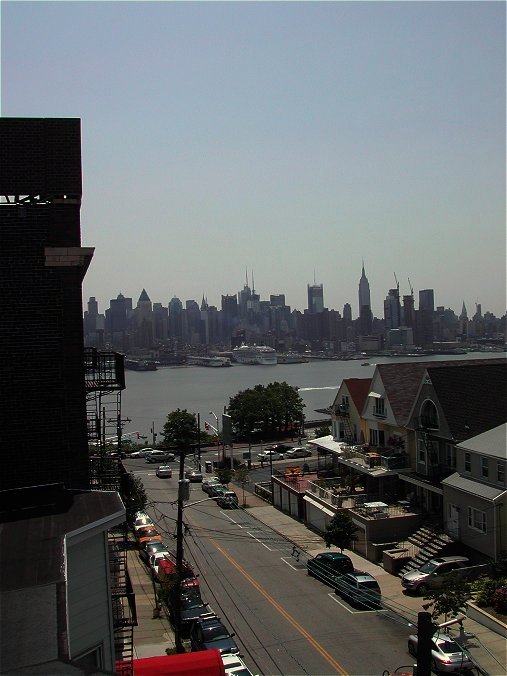


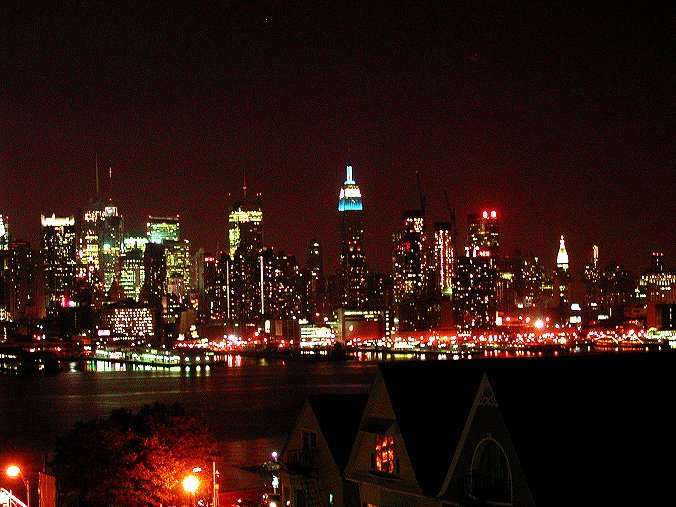
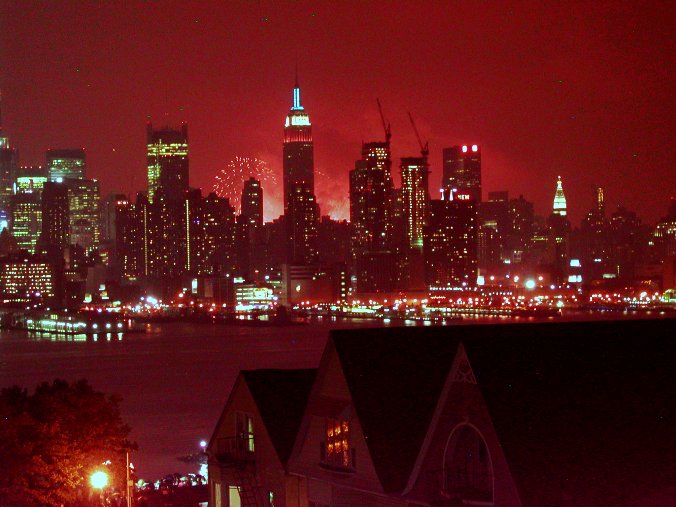
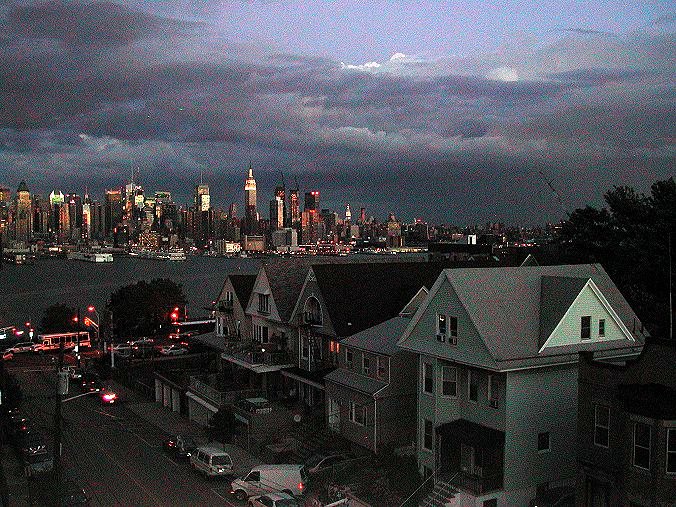

Too Dumb to Vote: From the LA Times article on Prop. 8 (as of 2:08am Wednesday morning):
Amy Mora, a 26-year-old teacher, came with her mother to a polling place in Lynwood on Tuesday morning. She said she believes gay people have the right to marry one another. But she said she voted in favor of Proposition 8 because she does not believe students should be taught that gay marriage is acceptable.
In a rational world, the only correct response to such a belief would be:
Congratulations, Amy Mora! You have forfeited your right to vote. Ever.
My Predictions for the Election: I have two scenarios in my head, the "Obama wins by not much" and the "Obama by a landslide."
In the first scenario, I'd see Kerry states (252) plus Iowa (7), New Mexico (5), Colorado (9), Nevada (5) and Virginia (13), for a total of 291. Likely he'll get one or more of Missouri, North Carolina and Florida, which could add 11, 15 or 27, respectively (for a total of 302, 306 or 318. Ohio I also see as a tossup, which would add 20 or not (322, 326 or 338). So, most likely I think the results will be about 330 electoral votes in this scenario. Popular vote would be 52/46/2. In this scenario, Senate would get the three safe takeovers (Virginia, Colorado, New Mexico) plus Alaska, Oregon and New Hampshire. North Carolina is a toss-up, so it's either 6 or 7 pickups. In regard to house seats, I see pickups in this scenario of 20-25.
For the landslide scenario, I see popular vote of 58/40/2, and the electoral map giving every state mentioned above (364) to Obama, plus Indiana (11), North Dakota (3) and Montana (3) for a total of 381. If it's a really big landslide, I'd say Alaska (3) will go (the latest poll puts it a few points difference between Obama/McCain), along with Arizona (5), South Dakota (3), Mississippi (6) and West Virginia (5) for 408. For the Senate, I then see all the Dem pickups winning, which would mean that Dole and Coleman both lose, plus McConnell in KY, Chambliss in GA and Wicker in MS, which gives you 10 pickups in the Senate. In that scenario, I'd see 40-50 pickups in the House (just a wild guess, as I don't even know if that's possible).
So, my two scenarios:
| | Pessimistic | Landslide |
| Pop. Vote | 52/46/2 | 58/40/2 |
| EV | 322-38 | 408 |
| Senate | 6-7 | 10 |
| House | 25-30 | 49-50 |
I would be surprised to see more than one aspect of the optimistic scenario come true, but not surprised it one of them comes close, though the higher the popular vote total, the more likely it becomes. I expect something in between the two scenarios, but probably closer to the pessimistic than the optimistic.
|
|
| |
|
|
|